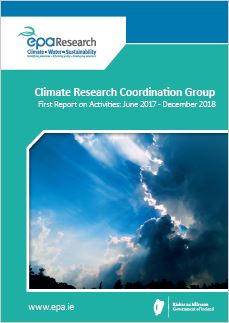
Authors: This report has been prepared by the Climate Research Coordination Group with the assistance of Flannery Nagel Environmental Ltd. Edited by Frank McGovern, Alice Wemaere and Lisa Sheils (EPA). May 2019, May 2019
Year: 2019
This first report presents a summary of the Climate Research Coordination Group’s activities during an 18-month period from June 2017 to December 2018.
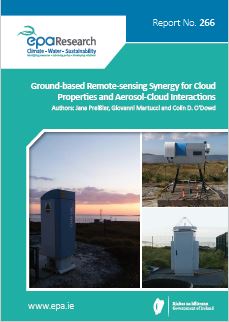
Authors: Jana Preißler, Giovanni Martucci and Colin D. O’Dowd, February 2019
Year: 2019
Clouds and aerosols play an important part in climate processes; however, their interactions are not well understood. To study the effect of both natural marine and anthropogenic aerosols on clouds and cloud optical properties we looked at a mix of information from remote-sensing and in situ instruments from more than 6 years.
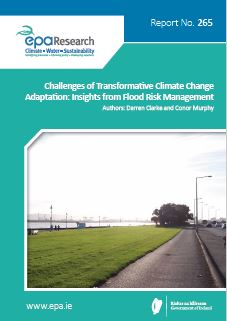
Authors: Darren Clarke and Conor Murphy., January 2019
Year: 2019
Increased attention is now being given to the need for transformative change in dealing with flood risks. This report addresses the lack of knowledge about the challenges associated with attempting transformative change, by drawing on findings from 11 flood risk management case studies across four European countries (Austria, France, Ireland and the Netherlands).
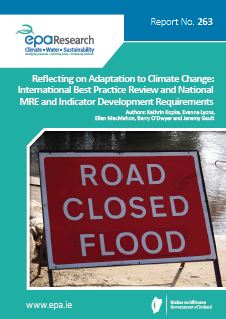
Authors: Kathrin Kopke, Evanna Lyons, Ellen MacMahon, Barry O’Dwyer and Jeremy Gault., November 2018
Year: 2018
Adaptation Preparedness Indicators for Ireland aims to identify draft adaptation indicator sets. The project carried out a review of international best practice to ascertain criteria and constraints relevant to adaptation indicator development in Ireland.
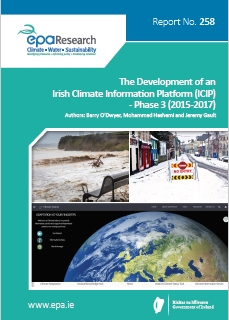
Authors: Barry O’Dwyer, Mohammad Hashemi and Jeremy Gault, September 2018
Year: 2018
The global climate is changing as a result of human influences; the impacts of these changes are already being felt across all continents and oceans and are expected to continue and intensify for many decades to come.
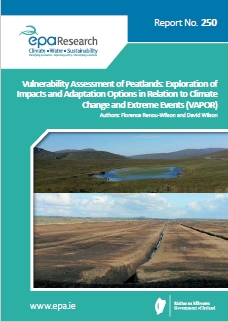
Authors: Florence Renou-Wilson and David Wilson, September 2018
Year: 2018
The climate changes predicted for Ireland by the end of the 21st century will have significant impacts on drained, rewetted and natural peatland systems. The VAPOR project was established to inform a transition to a climate-resilient Ireland by providing science-based information on the vulnerability of peatlands to climate change, including extreme weather events.
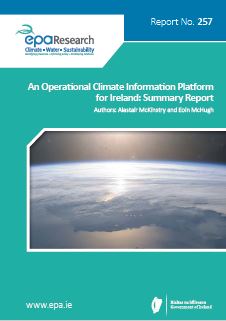
Authors: Alastair McKinstry and Eoin McHugh, August 2018
Year: 2018
Information on climate change and options for adaptation can be complex and inaccessible to key stakeholders and decision makers. This project has developed an Operational Climate Information Platform (OCIP) to disseminate the current data and guidance on climate change for Ireland. The OCIP is scalable, maintainable and can be continuously updated with new data that are generated from operational observation systems and research.
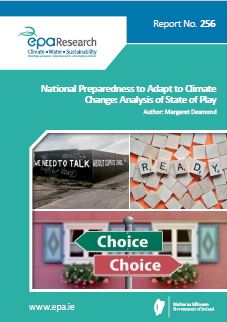
Author: Margaret Desmond, June 2018
Year: 2018
The goal of international and national climate adaptation policy is the transition to a low-carbon, climate-resilient society and economy. This new assessment interrogates in detail Ireland’s preparedness for adaptation action, with a focus on seven key areas related to the adaptation plan-making process.
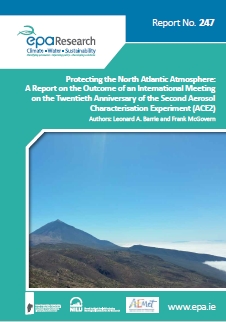
Authors: Leonard A. Barrie and Frank McGovern, May 2018
Year: 2018
The North Atlantic Ocean is flanked by four major continental regions, and is impacted by emissions from these regions, including those from the major conurbations and industrial regions, as well as by emissions from intercontinental and regional transport systems.
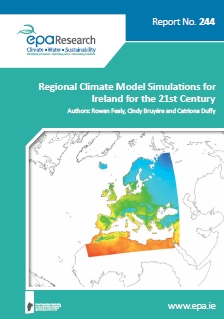
Authors: Rowan Fealy, Cindy Bruyére and Catriona Duffy, May 2018
Year: 2018
The model simulations represent Ireland’s contribution to the European component of the Coordinated Regional Downscaling Experiment (EURO-CORDEX), a World Climate Research Programme (WCRP) initiative to address climate information needs at the regional level.
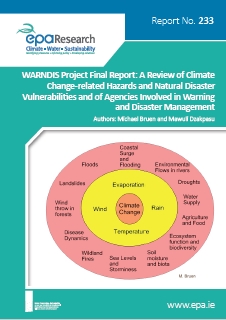
Authors: Michael Bruen and Mawuli Dzakpasu, March 2018
Year: 2018
The purpose of this study was to identify and review the main types of natural disasters that may be impacted by anticipated climate change; identify the key agencies involved; assess their roles and capabilities; and identify existing and new potential data streams to assist with warning and disaster management.
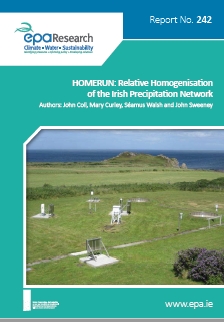
Authors: John Coll, Mary Curley, Séamus Walsh and John Sweeney, March 2018
Year: 2018
Long instrumental records are rarely, if ever, homogeneous and most decade-to-century-scale time series of atmospheric data have been affected by changes caused by climatic and/or non-climatic factors. Nevertheless, accurate climate data are a prerequisite for basing climate-related decision-making on, and quality-controlled homogenised climate data are becoming integral to efforts across many countries to deliver climate services.
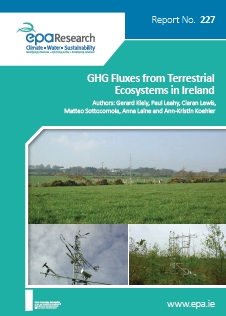
Authors: Gerard Kiely, Paul Leahy, Ciaran Lewis, Matteo Sottocornola, Anna Laine and Ann-Kristin Koehler, January 2018
Year: 2018
Irish grazed grasslands are a sink for carbon dioxide and a source for methane and nitrous oxide. Irish forests and pristine peatlands are sinks for carbon; however degraded peatlands are sources for carbon.
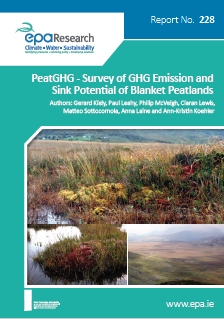
Authors: Gerard Kiely, Paul Leahy, Philip McVeigh, Ciaran Lewis, Matteo Sottocornola, Anna Laine and Ann-Kristin Koehler, January 2018
Year: 2018
Pristine peatlands are mostly sinks for carbon, while harvested or cut-away peatlands are sources of carbon. The principal pressures on Irish peatlands are associated with anthropogenic activities over the past few hundred years.
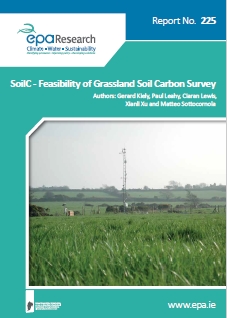
Authors: Gerard Kiely, Paul Leahy, Ciaran Lewis, Xianli Xu and Matteo Sottocornola, October 2017
Year: 2017
Research 225 on SoilC - Feasibility of Grassland Soil Carbon Survey
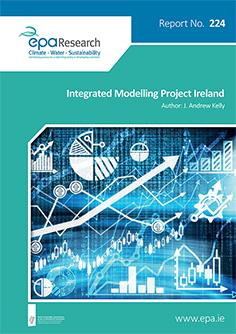
Author: J. Andrew Kelly, September 2017
Year: 2017
Research 224 on Integrated Modelling Project Ireland
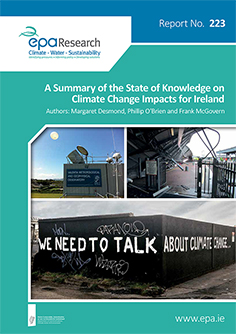
Authors: Margaret Desmond, Phillip O’Brien and Frank McGovern, September 2017
Year: 2017
Research 223: A Summary of the State of Knowledge on Climate Change Impacts for Ireland
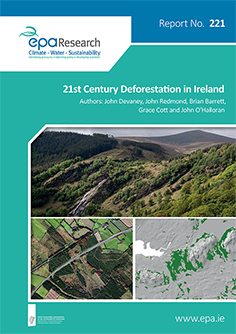
Authors: John Devaney, John Redmond, Brian Barrett, Grace Cott and John O’Halloran, September 2017
Year: 2017
Research 221 on 21st Century Deforestation in Ireland
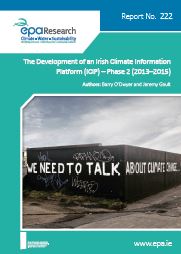
Authors: Barry O’Dwyer and Jeremy Gault, August 2017
Year: 2017
Research Report 222 on The Development of an Irish Climate Information Platform (ICIP) – Phase 2
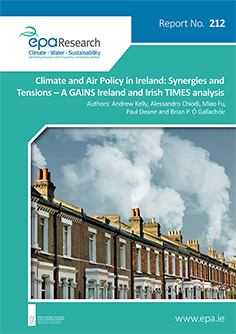
Authors: Andrew Kelly, Alessandro Chiodi, Miao Fu, Paul Deane and Brian P. Ó Gallachóir, April 2017
Year: 2017
Research Report 212 on Climate and Air Policy in Ireland: Synergies and Tensions – A GAINS Ireland and Irish TIMES analysis